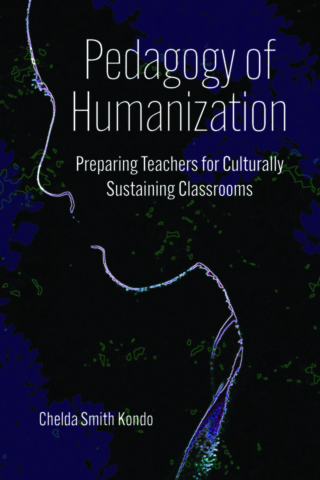
Library E-Books
We are signed up with aggregators who resell networkable e-book editions of our titles to academic libraries. These editions, priced at par with simultaneous hardcover editions of our titles, are not available direct from Stylus.
These aggregators offer a variety of plans to libraries, such as simultaneous access by multiple library patrons, and access to portions of titles at a fraction of list price under what is commonly referred to as a "patron-driven demand" model.
E-books are now distributed via VitalSource
VitalSource offer a more seamless way to access the ebook, and add some great new features including text-to-voice. You own your ebook for life, it is simply hosted on the vendor website, working much like Kindle and Nook. Click here to see more detailed information on this process.
Language: English
The purpose of Pedagogy of Humanization: Preparing Teachers for Culturally Sustaining Classrooms is to build a critical mass of educators who know how to employ the principles of critical pedagogy in elementary classrooms. This includes attention to the various knowledge, skills, and dispositions required of critical pedagogues in their curricula, instruction, assessment, classroom environment, and relationships. From Critical Race Theory (CRT) to restorative justice-oriented classroom management, the theoretical is made practical. Moreover, the structure of the book follows the curriculum of a traditional teacher education program, making it complementary to any teacher education course.
The Pedagogy of Humanization is the first book to bring together the practice (how) and theory (what and why) of inclusive and asset-based teaching. In this book, a group of teacher-educators across disciplines explore their personal and professional identities to reveal the potential for applying each tenet of culturally relevant pedagogy in their respective fields. Filled with anecdotes, exercises, user-friendly theories and examples, readers will learn how teachers can humanize themselves to have the capacity to be effective teachers of children who have been dehumanized and underserved by traditional teaching and schooling.
Pre-service teachers will read this book so that they can connect the material they study in teacher education courses to the daily work of being an educator who aims to be justice-oriented. However, this is not a “foolproof” guide or “how-to” manual that could be completed without direct support from mentors and colleagues. Instead, readers will practice the sort of engagement in individual and community growth that ignites the possibility of teaching as a force for social change. In many ways, chapters of the text could be used through a flipped classroom approach whereby faculty invert the typical cycle of content acquisition and application. The book will prove to be a valuable resource as a teaching text in classrooms devoted to critical pedagogy, Critical Race Theory, social justice, and other topics necessary to produce teachers who are prepared to maximize their effectiveness in educating today’s students.
Acknowledgments
Preface
Chelda Smith Kondo
Section 1: Essential Foundations
Chapter 1: Social and Cultural Foundations (Historical Grounding: From Multicultural Education to Culturally Sustaining Pedagogy
Chelda Smith Kondo
Chapter 2: Personal Identity: Positionality, Intersectionality, Biases, Triggers
Chelda Smith Kondo
Chapter 3: Critical Child Development
Tameka Ardrey
Section 2: When Children Go to School: Honoring Diversity and Difference as a Moral Imperative
Chapter 4: Practicing Culturally Relevant Pedagogy with Special Education Students
LaPortia Mosley and Laura Vines
Chapter 5: Practicing Culturally Relevant Pedagogy with Multilingual Learners
Alexandra J. Reyes and Anne Valauri
Chapter 6: Classroom Management: History & Application
Chelda Smith Kondo and Montana Smithey
Chapter 7: Culturally Responsive Classroom Management
Chelda Smith Kondo and Montana Smithey
Section 3: Content Areas
Chapter 8: Math with Academic Rigor & Cultural Competency
Montana Smithey, Sam Rhodes and Alesia Mickle Moldavan
Chapter 9: Math with Critical Consciousness
Sam Rhodes, Alesia Mickle Moldavan and Montana Smithey
Chapter 10: Science
Katie Lynn Brkich
Chapter 11: Social Studies
Ariel Cornett and Erin Piedmont
Chapter 12: Literacy
Kara M. Taylor
Chapter 13: Arts
Alexandra J. Reyes
Chapter 14: Physical Education
Deborah A. Garrahy
Appendix
About the Authors
Index
“Culturally relevant pedagogy is not just an instructional method grounded in sound evidence and research; it’s an approach to life and learning rooted in humanity—one that embraces how we best learn, how we best grow, and how we best realize our full potential as individuals and as a collective. But in a time of sociopolitical tension, where even the mere utterance of “culture” in education can draw ire or censure, teachers need not only guidance on how to teach in culturally relevant ways, but also assurance that we should. In Pedagogy of Humanization, Smith shares what culturally sustaining classrooms can look and sound like across multiple content areas, demonstrating how they shape minds, change hearts, and uplift our shared humanity.”
Takeru “TK” Nagayoshi, 2020 Massachusetts Teacher of the Year and recipient of the 2021 Horace Mann Award for Teaching Excellence
“High praise for the Pedagogy of Humanization: Preparing Teachers for Culturally Sustaining Classrooms by Chelda Smith Kondo where one journeys through and with culture to the heart of a humanistic pedagogy that embraces youth as complex individuals worthy of dignity and respect. It insists that all teaching is political and how, at its best, leads to both individual and collective empowerment.”
Angela Valenzuela, Ph.D., College of Education, University of Texas at Austin



